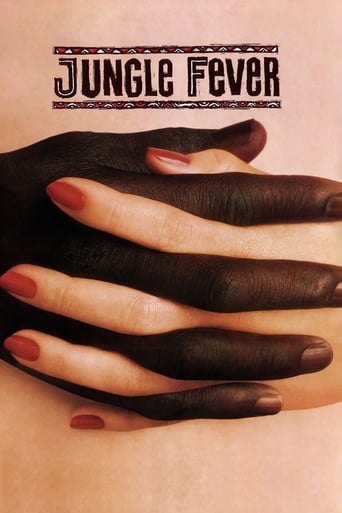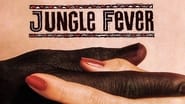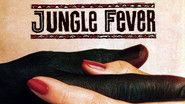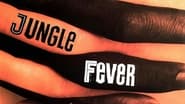ElMaruecan82
Spike Lee's "Jungle Fever" is an eye-opening introspection into the limits of that so-called melting pot sold by America as the epitome of tolerance and universalism... yet contradicted by the statistics and all the racial tension that prevailed in the early 90's. As a social commentary, the movie raises many important issues about interracial relationships in a less politically lauded tone than the iconic "Do The Right Thing", which is a wise choice for a movie mostly centered on human relationships.Through Stevie Wonder's titular song, "Jungle Fever" refers to the diagnosis of that strange mutual attraction between two persons from different races. The term strongly implies the idea of a relationship against Nature's law, if not a sickness, a deviation. And the central couple to deviate is Flipper, an ambitious architect, and Angie, his new secretary. He's Black, she's Italian. He lives in Harlem, she's from Benston Hurst, he's married with one daughter, she has three men, and two too many: her father (Frank Vincent), and her two brothers. Angie's doom is that she's young and single enough to be the overprotected sister, but mature enough to take care of the house. Angie dates Paulie, a shy and affable storekeeper (John Turturro) in a relationship that doesn't really ring true. Whatever is obviously lacking, Angie would find it in Flipper.Spike Lee's direction patiently depicts the growing attraction between Flipper and Angie. Interestingly, the first door to a growing intimacy is opened when they break the taboo of races and talk about it in the most casual way. And after that, we stop looking at the difference of skins, and pay more attention to the contents of their hearts. So they have sex, and no sex scene is sugarcoated in Spike Lee's film, not overdone either, but what is Spike Lee's point? To insist that it's only sexual like in adultery, or because of the 'Jungle Fever'? Whatever theory we believe in, the relationship would be wrong, but Lee cares less about pleasing us ethically than inviting us to examine the aftermath of that pivotal night where a Black man and a Italian (Caucasian) woman … did it. And the way the relationship evolves could be perceived as bad writing on the surface, while it's only extremely well-written 'bad reactions'. For one thing, the adultery is less condemned than its interracial nature. Flipper's wife, Drew (Lonette McKee) is from a mixed couple, and always feared to be only one step in Flipper's attraction process toward light skinned women, until he'd finally go with a plain Caucasian. Flipper's denial might be sincere but then why did he ask his bosses to only hire African American women? Did he know he would automatically fall in love with a Caucasian? The ambiguity remains and is displayed from a different perspective during a dinner with Flipper's parents played by the veteran actors Ossie Davis, as a fanatic preacher, and Ruby Dee, a loving mother and devoted wife. Flipper's father reminds Angie that white women always sensed an exciting mix of fear and fascination toward Black men and this is what ultimately tarnished the purity of the race, by providing so many mixed ethnicities. While succeeding on the field of disturbing realism, this scene allows us to understand Flipper's background and the amount of pressure he and Angie would endure, Angie, almost beaten to death by her 'dishonored' father, is then coldly compared to a whore. The couple wouldn't survive this last display of hatred and rejection, and in a very thought-provoking approach from Spike Lee, Flipper breaks up with Angie with a very calculated arrogance by pretending it has never been love. In a way, he joined the cause of those who pretend it's all about black men seeing that white is right women-wise, and white girls seeing blacks as sexual supermen, Jungle Fever … again. Flipper uses an obvious carapace to hide his own weaknesses. In many intimate scenes, he's the one lying beneath the shadow, while Angie's face shines under the window's light. She's genuinely in love with him while Flipper opts for a more convenient pragmatism. Again, no one is right or wrong, Flipper has many responsibilities and Angie's simply in need of a disinterested love, she's the victim of this relationship, as the one who lost the most, her 'honor', her boyfriend, and the man for which she took the risk to lose everything. The counterpoint of this failed relationship is Paulie's tender and more optimistic romance. Paulie who also grew up with an authoritarian fatherly figure (Anthonny Quinn) and endures the racist pressure of his entourage, but finally decides to date Ordyl, the woman who's always so nice to her, regardless of any skin consideration. But Flipper and Angie's relationship is less the core than the starting point of the analytic journey into the myths that surround sex, part-pride, part-doom, total pressure, marked by a great deal of hypocrisy and suspicion, due to the weight of history. Here comes the most poignant subplot involving the crack addiction of Flipper's brother, Gator, Samuel L. Jackson in an Oscar worthy performance. Gator's descent into self-destruction is the emotional pillar of the film allowing us to put Flipper's romance into perspective. There's more to worry about for the Black community, which in quest of its identity is torn between two unacceptable realities: degradation or obedience to the white man rules. Is 'Jungle Fever' the first step of that assimilation? The ending is a father's cry of despair for never seeing his daughter falling in that trap anyway. "Jungle Fever" works less as a romance than as realistic depiction of the racial myths poisoning the society. Through many secondary characters with an impressive level of depth and believability, we realize that most of them defines themselves through their ethnicity … as pure survival instinct. When the world is a jungle, it can only inspire self-preservation.
DemiRonin
Jungle Fever has a star packed cast that delivers marvelous performances. Unfortunately, they are wasted on Lee's loosey goosey directing. Jungle Fever opens with Spike Lee's favorite character of all time, New York. After a plethora of images of street signs, subways, Harlem, and the words "Spike Lee" we open on a slow motion shot of a newspaper flying through the air...which seems to have no other significance than presenting the words "The New York Times"! After which we see a sex scene with Flipper played by Wesley Snipes loudly making love with his black wife. Why mention black? Because this is a movie about race, and since Jungle Fever is not gonna put in the effort to tactfully express its theme neither will I. Flipper is an upper-middle class architect working at a firm controlled by two white men. Although putting it in pen and paper that he requests a black secretary instead he is given a young Italian American woman named Angie. Angie lives at home providing the motherly stand in for her very Italian father and brothers. Flipper and Angie, never having been intimate with anyone outside their race (except for Flipper's half Caucasian wife) work late into the evenings and eventually build an attraction to each other which Spike Lee calls "Jungle Fever". Thus, their interracial affair begins causing tension to build and explode between a multitude of characters. In addition Flipper also has a crack head brother played by Samuel L Jackson who runs around with his crackhead girlfriend played by Halle Berry looking to score cash from all his bloodlines including his poor mother who can't help but give into her 1st son when he does a little dance. The film's time is split between an assortment of characters who make up a collection of stories on interracial relationships and the ethnic hardships of New York Blacks and Italians. To give an example of how over handed and disjointed the racism is portrayed there is a scene where Flipper and Angie are pretend boxing. Flipper grabs Angie pinning her onto a car when Police officers show up forcing Flipper in a submissive position shoving a gun into his face. Obviously they had misread the situation but with Flipper screaming "I'm gonna kill you!" with his hands on her neck its understandable why the officers jumped to that conclusion. There's also a scene where Angie's father beats her for having relations with a "nigger". Perhaps it's the age of the film and people back then needed racism to be spelled out in a very overt and sensational manner. Jungle Fever is without a center jumping all over the place with extremely poor editing. The editor Samuel Pollard has edited mainly documentaries since, which is fantastic. The further he stays away from narratives the better. I'm trying to figure out how these scenes possibly transitioned into one another in script. I know that Lee likes to do harsh transitions but this film is just ridiculous. Jungle Fever is littered with ueven pacing and scenes that lose their punch because people need to walk in and out of frame. Example: Flipper and Angie are being ignored at a restruant because they're interracial then at the end of the scene when Queen Latifah, playing the waitress, walks off there's a 3 second cutaway where two bystanders say "She's White!?" "Mhmm Hmm" Jungle Fever is a film that indulgently satisfies itself. You feel ever bit of Lee's directorial manipulation while be beats you over the head with dialogue after dialogue about people's opinion on race & society. In fact there is a four minute scene of 5-6 black women just talking in a room about how about how they are disenfranchised. What is the point of a camera if you're just going to film taking heads? The camera angles and techniques in this film are all over the place in this film. In a scene where Flipper is asking for partner the camera just spins around them for about 3 minutes. I'm sure it was hard technique to film but why do these obtrusive techniques show up randomly throughout the film. I'm wondering if Lee showed up on set and rolled a dice every day. "OH look It's a 3, that means today I wanna put me and Wesley on a dolly and we are just gonna do this scene like we're drifting like ghosts". Strange camera techniques like these make me believe that Spike Lee wanted to make an experimental film. On the plus note all the actors are amazing and Spike Lee has a great eye for talent. Samuel Jackson STEALS this movie! Every scene with Jackson is a treasure and I'm sure when he's given his life time achievement award and there showing clips of his work, Jungle Fever will be contained in that reel. This movie is fun to watch to watch for the acting but I would recommend a more contemporary film such as "Everday People" [2004] if you wanted to see a New York film dealing with race.
Hint523
I am a huge fan of Mr. Spike Lee. I find his talent is overlooked by his radicalism. But if you ever study "Do the Right Thing", you can see that any man who can act, write and direct such a powerful, provoking, and funny film is genius. I have since then made it a goal to see as many "Spike Lee Joints" as possible.Jungle Fever is the story of Flipper, a black middle-aged man from Harlem with a large constellation of friends and family. He is frustrated with his job, since he cannot seem to get a raise. At his job he meets Angie, a young Italian intern with a boyfriend and a family of 4 older men she has to take care of. When they meet, "it's Jungle Fever". It seems scores of famous actors portray members of either side's family and friends.Jungle Fever is clearly a similar subject to Do the Right Thing, or any of Lee's films. All his films tackle race and one other thing. With He Got Game it's race and sports, with Malcolm X it's race and history, and so on. Jungle Fever is set up to tackle race and sexuality. Obviously this is what Spike enjoys and what he does best.While I was watching this movie, I had hopes that it would become one of my favorites. For a while, it seemed it could. However, the film takes a sudden change when Flipper's brother, Gator (played by a very young Samuel L. Jackson), comes into the picture. Gator is a crack-head who mooches off of his parents (Ossie and Ruby) and is obsessive over getting some dope.From that point on, the film becomes very little about the premise. It seems that from then on the movie is about the dangers of crack. This includes a long scene where Flipper is looking for his brother among a warehouse full of crack-heads, and many more scenes with this, all leading up to a horrible ending.I think what happened was Spike Lee tried to cover sex, drugs, and race into one movie, and though attempts were good, it was not a success. I respect the movie, the music is great, the beginning is excellent, but eventually it drops off. I guess the moral is it should have been two movies.
johnnyboyz
Lots of hate and not much love is the feeling I get when looking this film up; ironic then that the idea of interracial relationships in 1990s America has much the same stance on the idea – stick to what you know or else people who have long since died will be angry at you, oh and the current parent who hasn't died (the father in both cases) will either threaten to or indeed literally beat you senseless.I don't think Jungle Fever, directed by Spike Lee, is all that bad in fact I found it interesting, engaging and somewhat tragic which means I liked it; I liked it a lot. I think one of the primary reasons this film works is that it achieves something extremely difficult and that's being able to get across a narrative of love, loss and temptation all the time being able to put across and offer opinions on race and ethnicity whilst also being able to merge in a healthy and satisfying amount of humour which, oddly enough, only really comes along when the film is dealing with its 'tragedy' sub-plot involving Gator (Jackson). The idea behind the character is tragic but it is Jackson's presence and approach to the material that makes it humorous: a crack addict that turns up at the most inconvenient of times asking for money, often doing a little dance in order to get it; but he does not learn the wrong of his ways and that's the tragic thing.So you see, the fact that Spike Lee has created this universe for all these issues to be digested and be put across all the time keeping you interest with some individual acting performances, good music and a fair amount memorable dialogue moments is extremely impressive – my favourite of which is Spike Lee himself portraying a character who goes up in extremities when he learns of an affair, the fact the wife doesn't know and then that the girl is actually white. Jungle Fever starts out in pretty humorous yet tragic circumstances, echoing the atmosphere to come for the rest of the film; the pre-film titles have road signs displaying things like 'drugs, left; crack, right' which is a damned if you do, damned if you don't idea that works amongst the upbeat music. It's this sort of juxtaposition in visuals that works and challenges the viewer as well as possibly being Lee getting across what life is like in these sorts of places 'No matter where you turn, you cannot escape certain failure'.So, to have the rather oddly named Flipper Purify (Snipes) as an architect who is living a good life with a great job with great prospects with a wonderful wife and kid gives us the sense he is an achiever but he cannot live in a district that is pleasant, so that 'tag' that you never escape the ghetto is present. Likewise, Flipper is a big cheese in his company but he must answer to two white yuppies ahead of him and when things get a little heated, it seems the two white men have defeated the hard working black character. But it is Flipper's own stupidity that sees him go on his journey of hell and self-discovery and all in the name of curiosity which is the film's only real flaw but I cannot hold it too much against it. This is a film in which everybody gets a bite of the cherry; the African-American characters in the film are people who are striving to survive (the credits suggesting the ghetto is a no win place suggests this) doing whatever means necessary no matter how high up you are (crack head or rich architect); Italians are people who perhaps come across as quite needlessly aggressive and yet are the sorts who hold onto values and friendships despite whatever situations arise – they are also people who look out for their sisters.Then there are the women; in what is one of Jungle Fever's more remarkable scenes, a half dozen women sit around and consolidate Drew (McKee) as she comes to terms with the affair. It is remarkable because it shows women have a voice and they are voicing their opinions in a true-to life manner – remarkable that Lee scripts this scene and shoots it not in a voyeuristic manner but one that lets us know how they feel; I wonder how many other films revolving around an male instigated affair would stop to include this scene? Jungle Fever is a film that has heart but it has brains to boot; there is another great scene when Frankie Botz (Badalucco) is being wound up over his girl and he slams people who are Aryan, blaming Hollywood (another Spike Lee scripted dig?) for it but this is right after heart of gold Italian Paulie Carbone (Turturro) points out that Italian's several decades ago who paid the blacks equal wages were hung for doing so; this echoes the overall theme of the film in a single scene, that being that "it is the 1990s, things like this happen" says Debi Mazar's character and that the disapproving parents should not be too affected by something that supposedly insults tradition.Jungle Fever is not about 'x' is black and shouldn't date 'y' because they're white; if anything it's about the reason to stick with your partner: if Flipper was curious as to what 'white' would've been like, surely that echoes compliment to Drew because he doesn't consider he so; even though she has been bullied over the light tone of her skin. Spike Lee has made something here that is epic and intriguing; tragic and yet funny at times. This is a modern piece trying to push out what's wrong and what's right: 'stay with partner' is better than 'stay with race' but that doesn't mean you have to choose the latter if you cannot keep the former.








